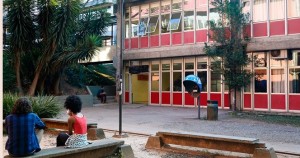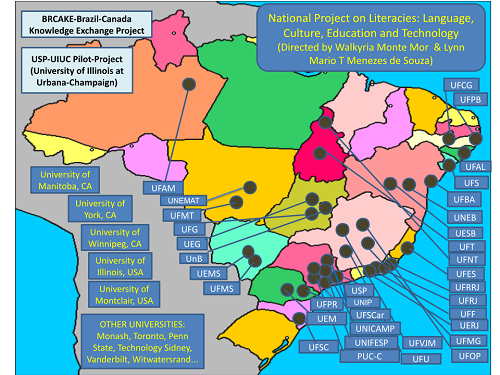The English Graduate Program celebrates its 50th Anniversary
(by Filipe Albessu Narciso) – June 25th, 2021
The graduate program in Linguistics and Literary Studies in English – widely known as — Programa de Pós-graduação de Estudos Linguísticos e Literários em Inglês PPGELLI — is celebrating its 50th anniversary. The PPGELLI was founded in 1971 and is dedicated to studying symbolic productions and ideological structures in the cultural context of the English language(s). The program is structured around three pillars: Linguistics, Literature and Translation Studies.

The PPGELLI is housed in the Department of Modern Languages, which is part of the Faculty of Philosophy, Languages and Humans Sciences (FFLCH). In its 50-year history, the program has been constantly reexamined by its members and in 2003 it was substantially reorganized in terms of research topics and theoretical production to become more inclusive. As of then, the program increased its scope from British and American language and literature to include new and other forms of literary creations and broader contexts in which English linguistics are applied.
One of the only postgraduate programs in Brazil completely dedicated to linguistics and literature in English, the PPGELLI emphasizes interdisciplinarity, through which the meanings of literature and linguistics are broadened.
According to Associate Professor and former program director, Elizabeth Harkot-de-La-Taille, the program’s academic research agenda is wide-ranging and includes history, anthropology, sociology, education, media studies, semiotics and other forms of art, such as cinematographic and theatrical art. Professor Harkot-de-La-Taille also points out that the PPGELLI research also addresses new and innovative areas, such as videogaming. Moreover, she stresses the disruptive nature of the program’s research and teaching activity, citing the case of courses and research projects on feminism and translation, and decolonial studies.
The program is organized around three main research areas — Linguistics, Literature and Translation — and structured in six lines of research: literary contacts; translation studies; cultural studies; language, education and society; literature and history; and foreign language and education.
The Masters program is 36 months long and the PhD program, 48. Students are selected once a year, and are expected to go through an English language proficiency test and a written examination based on a recommended reading list. Next, candidates submit their résumé and a research project, which will be discussed and assessed during an interview.
In the last 50 years, the program established itself and developed a strong reputation in preparing renowned researchers nationally and internationally. With more than 20 international cooperation partners, it has cultivated an extensive and active international network. Worldwide literacy projects and philosophical, sociological, semiotic and decolonial studies are among some examples of the range that PPGELLI productions have today.
The scientific production developed in PPGELLI is debated and studied in a wide array of educational and research contexts in Brazil as well. The program leads the national literacy project called Projeto Nacional de Letramentos: Linguagem, Cultura, Educação e Tecnologia, translated as ‘National Literacy Project: Language, Culture, Education and Technology’. In more than a decade of existence, this project has dozens of national higher education institutions as collaborators and has gone through three different stages. It also has organized more than 50 events, produced scores of masters and PhDs, and is one of the only projects in Brazil focused on basic education public school teacher development.

Professor Harkot-de-La-Taille stresses the social relevance of working with basic education teachers. “On a grand scale, our chance to disseminate critical and socially-aware knowledge is through education, especially basic education”, said the coordinator in an interview in Portuguese. By studying and discovering the best ways to prepare education professionals, the graduate course spreads its roots in society. She also emphasizes that the program contributes to the academic community and society as a whole in many other forms. At the University of São Paulo, for instance, the PPGELLI, through the International Office (Aucani) provides expert advice and support to English language education programs across Schools for students and also faculty.
In the last four years, PPGELLI has awarded 34 MA and 49 PhD degrees. Today, Associate Professor Harkot-de-La-Taille says that there has been a growing interest on the part of graduate candidates in PPGELLI despite the pandemic scenario. PPGELLI was able to adapt itself to the new digital context and has been attracting more participants in its talks, courses, events, group studies, and activities than ever. “Today, because of the increase in online activities, students and researchers from many different geographies have been reaching out to the program more than we had ever expected. This has broadened the impact of our work and enabled us to fulfill the mission of higher public education, which is inclusion and the sharing of knowledge. I believe this will continue even when the pandemic is finally over”.
